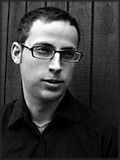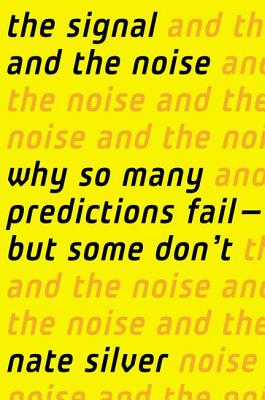 Put your money on chutzpah, and you’re likely to lose it, Silver says. In this primer on probability and uncertainty, the logician and fivethirtyeight.com blogger explains that overconfidence is one of the greatest pitfalls in predictions. In a series of examples drawn from politics, sports, stocks, and other iffy arenas, he shows that where the future is concerned, one should try a little skepticism–even humility.
Put your money on chutzpah, and you’re likely to lose it, Silver says. In this primer on probability and uncertainty, the logician and fivethirtyeight.com blogger explains that overconfidence is one of the greatest pitfalls in predictions. In a series of examples drawn from politics, sports, stocks, and other iffy arenas, he shows that where the future is concerned, one should try a little skepticism–even humility.
All Politics & Prose Bookstore in-store events are free and open to the public. All event titles are 20% off for members during the month in which the author appears at the store. There is ample parking available in the lot behind the store and in the surrounding neighborhood. If you can’t come to an event and still want an autographed copy of the book, you may purchase titles in advance either in the store, over the phone (202.364.1919 or 1.800.722.0790), or through Politics & Prose Bookstore website. When buying online, simply use the checkout comments field to indicate that you would like us to request the author’s signature at our event before shipping it to you. Event recordings on CD or MP3 are also available in the store and online.
“Nate Silver’s The Signal and the Noise is The Soul of a New Machine for the 21st century.”
—Rachel Maddow, author of Drift
Nate Silver built an innovative system for predicting baseball performance, predicted the 2008 election within a hair’s breadth, and became a national sensation as a blogger—all by the time he was thirty. The New York Times now publishes FiveThirtyEight.com, where Silver is one of the nation’s most influential political forecasters.
Drawing on his own groundbreaking work, Silver examines the world of prediction, investigating how we can distinguish a true signal from a universe of noisy data. Most predictions fail, often at great cost to society, because most of us have a poor understanding of probability and uncertainty. Both experts and laypeople mistake more confident predictions for more accurate ones. But overconfidence is often the reason for failure. If our appreciation of uncertainty improves, our predictions can get better too. This is the “prediction paradox”: The more humility we have about our ability to make predictions, the more successful we can be in planning for the future.
In keeping with his own aim to seek truth from data, Silver visits the most successful forecasters in a range of areas, from hurricanes to baseball, from the poker table to the stock market, from Capitol Hill to the NBA. He explains and evaluates how these forecasters think and what bonds they share. What lies behind their success? Are they good—or just lucky? What patterns have they unraveled? And are their forecasts really right? He explores unanticipated commonalities and exposes unexpected juxtapositions. And sometimes, it is not so much how good a prediction is in an absolute sense that matters but how good it is relative to the competition. In other cases, prediction is still a very rudimentary—and dangerous—science.
Silver observes that the most accurate forecasters tend to have a superior command of probability, and they tend to be both humble and hardworking. They distinguish the predictable from the unpredictable, and they notice a thousand little details that lead them closer to the truth. Because of their appreciation of probability, they can distinguish the signal from the noise.
With everything from the health of the global economy to our ability to fight terrorism dependent on the quality of our predictions, Nate Silver’s insights are an essential read.















